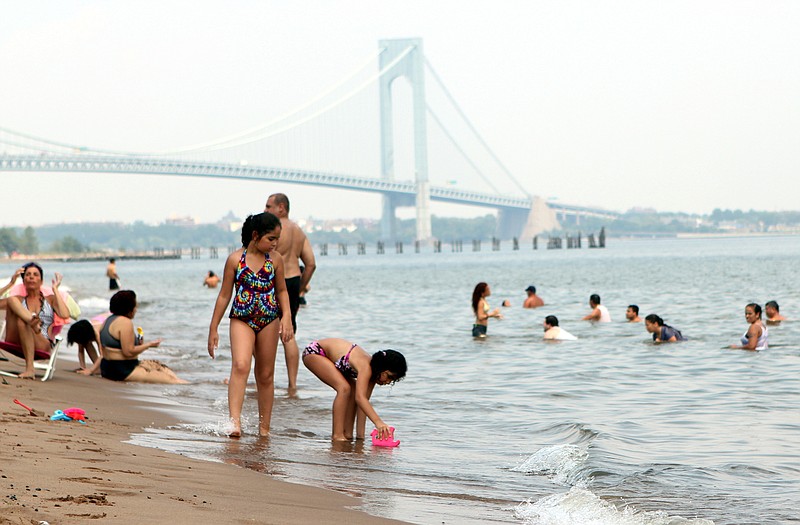NEW YORK (AP) - The urban Northeast baked like a potato wrapped in foil Friday as record-breaking, 100-degree temperatures and steambath humidity combined with the heat-trapping effects of asphalt and concrete to make millions of people miserable.
The mercury in Newark, N.J., reached 108, the highest temperature ever recorded in the city. Airports near Washington and Baltimore hit 105. Philadelphia reached 104, Boston 103, Portland, Maine, and Concord, N.H., 101 and Providence, R.I., 100. New York City hit 104 degrees, just 2 short of its all-time high, and with the oppressive humidity, it felt like 113.
Donald Demarque, a handyman, sat outside an auto repair shop in the broiling Bronx, waiting to get the air conditioner checked on his Nissan.
"It's only working at about half power," he said. "I think if it was a regular day I could put up with it, but not today. Today you don't want to have the car windows open."
In Baltimore, a homeless Dale Brown said he buys a $3.50 day pass to ride the commuter rail system to stay cool - and sober.
"I'm surprised more homeless people don't do that," he said. "That kills a lot of the day. One more day successful without drinking."
An old prison in Cranston, R.I., had to bring in portable air conditioners, fans and cold water for the 100 inmates on a cellblock with a broken AC. It had been out of commission for a month because it was so old a part had to be custom-made to fix it; the part is due Monday.
In Philadelphia, 50 of the city's 70 pools operated on 45-minute cycles to give everyone a chance to get in. Some New Yorkers were unable to take a dip to cool off at some beaches in Brooklyn and Staten Island after millions of gallons of raw sewage spilled from a wastewater treatment plant.
The heat wave wafted in from the Midwest - it began last weekend and did not break until Friday in Chicago - and is a suspected or confirmed cause in more than a dozen deaths around the country. On Friday, the medical examiner's office in Chicago listed heat stress or heat stroke as the cause of death for seven people. An 18-year-old landscaper who died Thursday night in Louisville, Ky., had a temperature of 110, the coroner said.
Jake Crouch, a climatologist at the National Climatic Data Center in Asheville, N.C., said the heat wave is taking its place in duration alongside deadly hot spells in 1988 and 1995 that lasted a week or more.
On Friday, power supplies were stretched, and utilities were hoping that some businesses would close early for the weekend.
Con Edison in New York set a record for power demand at 1 p.m., breaking a mark set Aug. 2, 2006, utility spokesman Bob McGhee said.
Several thousand New York homes and businesses were hit with blackouts; some were quickly restored. Voltage was deliberately reduced in several neighborhoods in the city and suburbs to keep underground cables from overheating; McGhee said customers wouldn't notice.
The electrical grid that serves 13 states, mostly in the Mid-Atlantic region, set an all-time record Thursday for power usage.
Dangerous-heat advisories and air quality alerts were sent out for most of the Northeast on Friday. Richard Ruvo, section chief in New York for the Environmental Protection Administration, said: "Today is a very bad day."
"When there's more power demand, there's more power plants running, and there's more pollution. We're seeing ozone levels above unhealthy levels in the entire Northeast and Midwest, not just in the cities," he said. "On days like today, the air quality affects everyone, not just asthmatics and the elderly."
Lauren Nash, a meteorologist with the National Weather Service, said the cities are experiencing the "urban heat island" effect.
"All the concrete and the blacktop warms up faster, so it keeps the city hotter and it stays hotter longer," she said. Overnight temperatures did not get below 80 in some areas.
New York Deputy Mayor Stephen Goldsmith said, "The danger isn't just the heat, it's also the heat underground. Much of our infrastructure is below ground."
"It's good in tornadoes, bad in heat," he said.
Richard Karty, who teaches urban ecology at the New School in New York City, said, "If one urban area is next to another urban area, like New York and Newark, it's just going to compound both the heat and the air pollution."
Dayana Byrnes, 21, of Waldorf, Md., learned something new about herself as she worked outdoors in Washington to promote a website with free bottled drinks.
"I didn't think legs could sweat," Byrnes said.
In Manchester, Conn., the fire department sent out a vehicle to distribute cold water to road crews.
Horse races were canceled at several tracks.
But hundreds of people who lined up outside the Izod Center in Newark to audition for NBC's "The Voice" were undeterred. And in Manassas, Va., Civil War buffs said the weather - perhaps 20 degrees hotter than in 1861 - would not prevent a 150th-anniversary re-enactment of the Battle of Bull Run.
George Alcox, 58, of Berea, Ohio, said the wool uniforms and muslin undergarments the re-enactors wear are "not as hot as they look."
"They're hotter," he said.

